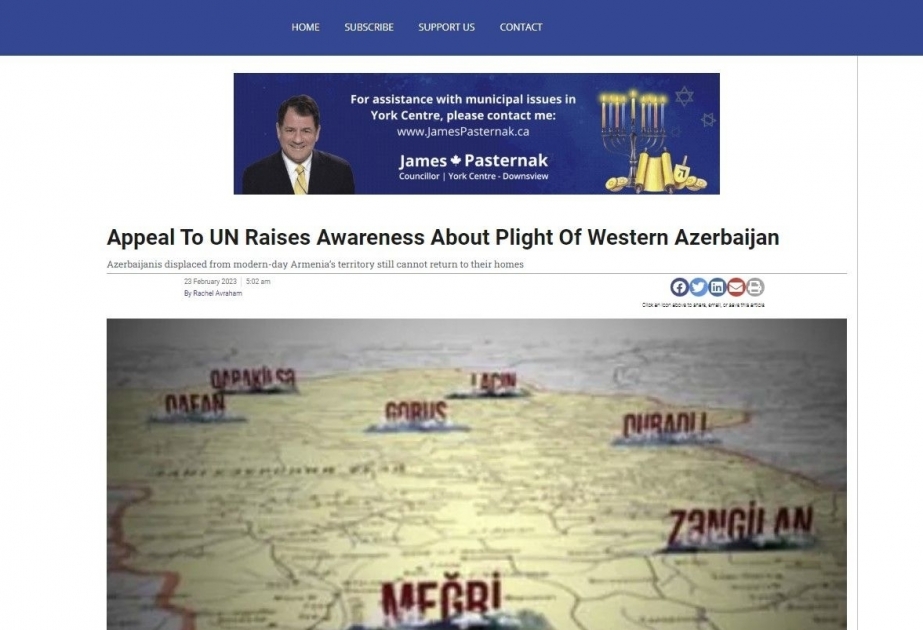
The Canada-based “TheJ.ca” Jewish media platform has posted an article by Israeli political analyst and journalist, CEO of the Dona Gracia Center for Diplomacy Rachel Avraham headlined “Appeal To UN Raises Awareness About Plight Of Western Azerbaijan.”
The article reads: “Recently, an appeal was circulated by the Western Azerbaijani community to the international community at the UN Security Council, the UN General Assembly and the Economic and Social Council of the United Nations, where the plight of Western Azerbaijani refugees was raised. According to various reports, this was the first large scale document aimed at making the voice of Western Azerbaijanis heard in the international arena.
Historically, Western Azerbaijan, which is in modern-day Armenia, was part of Azerbaijan. The city of Iravan, modern-day Yerevan, and Zangazur were historically majority Azerbaijani areas, till the Iranians and Russians decided to settle Armenians in the region on a massive scale. After the Soviets took over the area, Azerbaijanis were ethnically cleansed from the area.
According to 1916 data, there were over 373,000 Azerbaijanis living in Iravan. However, only 12,000 remained by 1922. Then, in 1988, over 300,000 Azerbaijanis were forcefully expelled from what would become modern day Armenia, thus bringing an abrupt end to the Western Azerbaijani community.
Alongside making this appeal, the Western Azerbaijani community recently adopted the “Concept on Ensuring Peaceful, Safe and Dignified Return of Azerbaijanis expelled from nowadays Armenia,” which proclaimed: “the ethnic cleansing committed against Azerbaijanis was carried out through violence, genocide, mass murder and other crimes against humanity and gross violation of human rights guided by the systematic activity of state authorities. This process was particularly violent and brutal in 1905-1906, 1918-1921, 1948-1953, and 1987-1991.”
According to them, “The consequences of these acts, as well as the actions committed by the institutions called ‘Republic of Armenia’ and ‘Republic of Mountainous Armenia’ in 1918-1921, in particular by the Soviet Union’s notorious leader Joseph Stalin, who signed a racist decision to concede many regions dominated by Azerbaijanis, including Zangezur, to Armenia and to deport a hundred thousand Azerbaijanis from Armenia, and by the Armenian SSR in 1987-1991, are still in place.”
According to the Western Azerbaijani community, “Armenia commenced a total ethnic cleansing campaign against Azerbaijanis living in the Armenian SSR. Such processes served to create a mono-ethnic space and territorial expansion contrary to human rights and international law. With such a racist and aggressive approach, Armenia not only expelled Azerbaijanis from their territories but also occupied the legally recognized territories of Azerbaijan.”
The community claims that Azerbaijan’s great victory in the Second Karabakh War “is an important step towards restoring justice and increases the chances for peace between the two countries.”
The community added that “The fact that Azerbaijanis displaced from modern-day Armenia’s territory still cannot return to their homes, and that the situation of mono-ethnic statehood, ethnic cleansing, and systematic racial discrimination continues in this country, is a great obstacle to the establishment of sustainable peace.”
Yashar Aliyev, the permanent representative of Azerbaijan to the United Nations, stressed in the appeal: “the community demands that the government of Armenia enable with an international process the safe and dignified return of ethnic Azerbaijanis to their homes in Armenia and the realization of their collective and individual rights after their return, and requests the support of the international community in this regard.”
“The circulation of the Western Azerbaijan Community’s appeal to the international community as an official document of the United Nations (UN) helped to inform more than 190 countries about Western Azerbaijan, the fate of our compatriots who were expelled from this region, as well as their desire to return back to their native lands,” spokesperson for the Western Azerbaijan Community, Ulviyya Zulfikar told the Azerbaijani media.”
